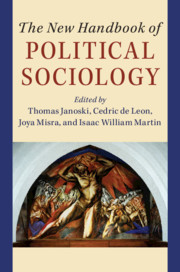Book contents
- The New Handbook of Political Sociology
- The New Handbook of Political Sociology
- Copyright page
- Dedication
- Contents
- Tables
- Figures
- Contributors
- Acknowledgments
- Introduction
- I Theories of Political Sociology
- II Media Explosion, Knowledge as Power, and Demographic Reversals
- III The State and Its Political Organizations
- 15 The Political Economy of the Capitalist State
- 16 States as Institutions
- 17 Nation-State Formation
- 18 The Political Sociology of Public Finance and the Fiscal Sociology of Politics
- 19 Politics, Institutions, and the Carceral State
- 20 The Political Sociology of Democracy
- 21 Revolutions against the State
- IV Civil Society: The Roots and Processes of Political Action
- V Established and New State Policies and Innovations
- VI Globalization and New and Bigger Sources of Power and Resistance
- Index
- References
17 - Nation-State Formation
Power and Culture
from III - The State and Its Political Organizations
Published online by Cambridge University Press: 22 February 2020
- The New Handbook of Political Sociology
- The New Handbook of Political Sociology
- Copyright page
- Dedication
- Contents
- Tables
- Figures
- Contributors
- Acknowledgments
- Introduction
- I Theories of Political Sociology
- II Media Explosion, Knowledge as Power, and Demographic Reversals
- III The State and Its Political Organizations
- 15 The Political Economy of the Capitalist State
- 16 States as Institutions
- 17 Nation-State Formation
- 18 The Political Sociology of Public Finance and the Fiscal Sociology of Politics
- 19 Politics, Institutions, and the Carceral State
- 20 The Political Sociology of Democracy
- 21 Revolutions against the State
- IV Civil Society: The Roots and Processes of Political Action
- V Established and New State Policies and Innovations
- VI Globalization and New and Bigger Sources of Power and Resistance
- Index
- References
Summary
Nation-states began to form, in Europe first, in the sixteenth century. The process of formation shaped the sorts of states that emerged and have endured to the present. It is best to begin by defining nation-states so that we can be clear on the objects whose emergence we want to explain. States, in Max Weber’s (1978 [1922]: 54) definition, claim a “monopoly of the legitimate use of physical force in the enforcement of its order,” to which Michael Mann adds the crucial qualifier, in “a territorially demarcated area, over which it claims a monopoly of binding and permanent rule-making” (1986: 37).
- Type
- Chapter
- Information
- The New Handbook of Political Sociology , pp. 458 - 483Publisher: Cambridge University PressPrint publication year: 2020
References
- 2
- Cited by

